In response to a petition filed by Twitter challenging Indian government orders to take down certain accounts, the government on Thursday, 1 September, told the Karnataka High Court that the constitution doesn't guarantee a fundamental right to anonymity.
It accused the platform of “not taking effective steps to prevent the spread of fake news or deliberate misinformation, and as such, misinformation content relating to sovereignty and integrity, national security or public order related issues are on the rise.”
The case is scheduled to be heard on 8 September.
‘Twitter Trying To Circumvent Lawful Orders'
In its 96-page response, the Union government insisted that Twitter's petition has no substance and should be dismissed.
“The present petition filed under the pretext of procedural non-compliance of Section 69A is nothing but a subterfuge and a device to overreach, defy and circumvent the lawful orders passed by competent authority of the sovereign country and to assert commercial power, showcase immunities from laws and absolute monopoly in the relevant international market,” the affidavit stated.
The government also said that it has only issued takedown orders for unverified accounts and it has no legal duty to give prior notice to such cases.
"There is no fundamental right of anonymity under Part III of the constitution. The only right guaranteed is the right to remain silent. As fortiori (as a result), the petitioner cannot defend Article 19 rights (freedom of speech and expression) of its unverified, untraceable and anonymous users. The said right is only available to an identified citizen of the country,” the government said.
The government also called the content management policies of Twitter "a failure” for not efficiently controlling misinformation.
The government also highlighted that the takedown orders were issued under the provisions of the IT Act, which overrides any policies made by Twitter.
“No platform is exempt from compliance for reasons of jurisdiction or nationality or non-applicability of laws or tags of global company. Foreign platforms providing services in the country shall not be entitled to claim that the Indian Laws and Rules are not applicable upon them. Any such claim is legally untenable,” it said.
(With inputs from PTI.)
(At The Quint, we question everything. Play an active role in shaping our journalism by becoming a member today.)
